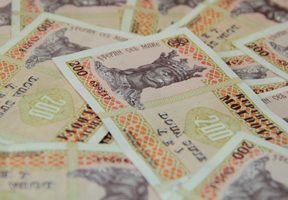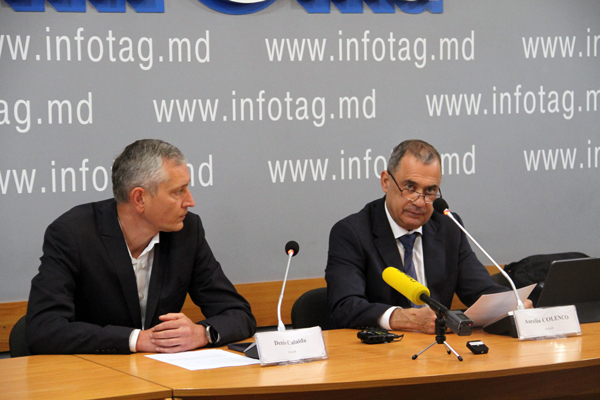Interview
CHEAP LEU DRIVES MOLDOVAN ECONOMY INTO RECESSION

Commentary by Infotag economic observer Alexandru Tanas.
A comparably weak inflow of foreign currency from export and population to foreign exchange offices could not support the forecasted correction towards a slight strengthening of Moldovan leu exchange rate against US dollar.
According to banks’ dealers, Moldovan leu’s own forces were enough only for several trading days, after which it again took up the old and began falling against the American currency.
“After a stage of official exchange rate strengthening from the level 14.7253 lei: 1US$, the national currency managed to grow to 14.5483 lei:US$1, and then the exchange rate trend reversed towards leu depreciation”, said one of bank dealers, noting that the national currency depreciation is also due to decline in euro exchange rate.
At the same time, participants on the foreign exchange market consider that the situation on it does not portend big jerks or sudden leaps in leu exchange rate against US dollar and euro even taking into account the weak currency flow.
“Influx of currency to the foreign exchange offices from population weakened also due to the rainy weather, which is somehow understandable: in such weather people are reluctant to go shopping, thus they buy less and exchange currency less”, said the dealer.
Other currency analysts assume that leu currency will give up its positions by small and barely noticeable waves of 0.01-0.02 lei per day against the American currency.
“A certain indirect influence is exerted upon Moldovan leu rate by the business activity, which calms down in connection to the election campaign. In such situation Moldovan leu will not fall sharply due to signals about repatriation by exporters of albeit small currency earnings. The currency for the exported wheat, sunflower and soya start coming to Moldova”, said the dealer.
Volumes of export earnings will be enough to satisfy the market demand for dollars and euro, until more serious players come, who will need large volumes of hard currency in late November and in December, where energy market operators will have to pay import of energy resources.
Such players as Moldovagaz and Gas Natural Fenosa will need large volumes of currency, which can not be satisfied only by repatriation of currency by exporters. And in this situation, it will be necessary to overstate the US dollar purchase rate in order to awaken the interest of those, who at a favorable rate will be ready to sell currency, procured for the future use.
For example, today the euro purchase price of 18.4 lei does not attract population, but we can not say that it does not interest people at all. As soon as it crosses the line of 18.5 lei for one euro, immediately will appear those, who will sell euros.
A similar situation will occur with US dollar, when those who have bought this currency for 14.25 -14.50 lei for US$1, will sell at the market supply of 14.85 -15.00, having a good profit due to exchange rate differences.
The leu cheapening has two sides of medal, which are as profitable as dangerous for the Government. Sincerely said, the authorities should have courage to admit that due to the leu getting cheaper, revenues to budget are growing. Because only due to excise taxes, customs duties and fees, established in hard currency and paid by economic agents in lei, the increase in daily revenues to the state treasury can be easily seen. And here, the Ministry of Finance (MoF) and the Government should be thankful to the National Bank of Moldova (NBM). Hiding behind the achievements of its strategic objective - controlled inflation, the NBM gave up on Moldovan leu exchange rate.
Although, it should be fairly recognized that the bank is properly ensuring that the national currency exchange rate would be no leaps, which would inevitably lead to adverse events on the foreign exchange market – excitement and panic. The consumer price index, for which the bank has been responsible for already three years, allows it to boldly go to leu depreciation in order to keep away the deflation processes.
However, the Government should not ignore the flip side, understanding that the cheapening leu brings the economy into recession. Even without digging deep, it is obvious that it becomes more and more difficult to repay external debts (state and private) with the cheapening leu, as well as provide raw materials and component parts for the export production, purchase equipment and machinery for agriculture modernization. But, without modern technologies and machinery in agriculture within the free trade regime with the EU, situation will put Moldovan agrarians on their knees, and some of them - on their blades.
It would not be desirable to put the fear in ourselves, but the cheapening leu and growing inflation may shake the quite stable financial and banking system, which will again lead to a rise in interest rates on deposits, on credits and on state securities, which have been reduced with so much difficulty.
The psychological aspect of the issue is alarming also. In the situation of the leu depreciation albeit controlled by the NBM, the population is losing its confidence to the national currency, which automatically leads to people turning to the foreign currency. And here one should not be a genius to understand that at leu depreciation against US dollar for, let us say, 8% per year, taking into account 5% annual inflation, the deposit in lei with 8% interest rate is far from reaching the national currency losses level of 13% (depreciation plus inflation).
The population is seeking for uncomplicated way out of the market situation, trying to protect themselves from the national currency depreciation, albeit dosed by the National Bank.
Thus, there is a certain barrier in the procedure of “dosed” leu depreciation, at crossing which the relative stability of interest rates will be broken. And even if this is not welcomed by the regulator in administrative terms, the very situation on the market will force its participants to change rules of the game, which can not exist without the enthusiasm and material interest.
Judging by the confident behavior of the market regulator, it seems to be a player, who knows the line Moldovan leu exchange rate can not cross. With all this, it should not be ignored the fact that such behavior of the NBM is just a good face on a bad game, when the bank does not consider appropriate to waste its foreign exchange reserves for an alleged strength of the national currency. Recognizing the existence of numerous opponents of the NBM, it should be recognized also existence of the bank supporters, including the IMF itself, which has positively assessed a flexible formation of the leu exchange rate to mitigate the impact of external pressure.
























Add Comment